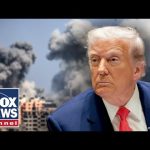On October 8, 2025, the White House became ground zero for a long overdue conversation about the violent, lawless fringe calling itself Antifa, as President Trump convened conservative journalists, influencers, and senior officials to map a response. This was not a ceremonial photo op — it was a strategy session with real people who have faced the mob on the street and officials who are prepared to bring federal muscle to bear.
Among the participants were Homeland Security Secretary Kristi Noem, Attorney General Pam Bondi, FBI Director Kash Patel, and frontline reporters who’ve been physically targeted for doing their jobs, including Andy Ngo and Turning Point contributor Savanah Hernandez. These are voices with first-hand experience of the chaos left-wing mobs unleash, and they were invited into the room precisely because local governments have repeatedly failed to protect citizens and journalists.
President Trump made no attempt to sugarcoat the threat — he vowed federal law enforcement would be “very threatening” in pursuing Antifa after his administration moved to label the movement a domestic terrorist organization. That kind of clarity is refreshing in an era when elite institutions reflexively excuse street violence; toughness, not timidity, is what restores order.
Homeland Security Secretary Noem went further, warning that Antifa has grown into a sophisticated, coordinated menace and drawing sharp comparisons to transnational criminal and terror networks — comments that unnerved the usual media defenders but reflected the lived reality on the ground. Whether you like her rhetoric or not, the point is plain: groups that organize violence and prey on innocent Americans cannot be treated as harmless protest clubs.
Journalists who’ve been targeted by militants delivered stark testimony. Andy Ngo recounted being attacked and hospitalized while covering Antifa actions, and Savanah Hernandez described being hunted and threatened for reporting on riots and ICE protests — testimony that should make any defender of free speech sit up and listen. These are not abstractions or partisan talking points; they are wounds inflicted on Americans who dared to document lawlessness.
The administration’s plan — to pursue perpetrators, choke off funding and tech enablers, and use federal tools where local leaders will not — is the right approach. Left unchecked, decentralized mobs exploit legal gray areas and sympathetic local officials; the federal government stepping in sends a clear message that violent extremism has consequences.
If America is to remain a nation of law, not of the mob, now is the moment to back leaders who act, not those who lecture. Washington’s job is to protect citizens and the press, to ensure public spaces are safe, and to hold violent actors accountable — and this roundtable was a necessary first step toward delivering on those promises.




